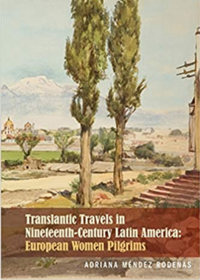
- University of Missouri
- Professor of Spanish, Director of Afro-Romance Institute
- Affiliation During NDIAS Fellowship: University of Iowa
- Residential Fellow (2011-2012)
- “From Paradise to Diaspora: Natural History in the Americas”
Born in Havana, Adriana Méndez Rodenas has recently joined the Romance Languages & Literatures faculty as Professor of Spanish and Director of the Afro-Romance Institute. She has published extensively on the literatures of the African diaspora in Cuba in major peer-reviewed journals and interdisciplinary anthologies. Her seminal essays on anti-slavery narrative have appeared in Cuban Studies, the compendium Cuba—People, Culture, History, edited by Alan West Durán (2012), and América Sin Nombre, the research journal of the Universidad de Alicante, in a special issue dedicated to Cuba y el Caribe: Raza, diáspora, e identidad cultural (2014).
Professor Méndez Rodenas is a specialist in nineteenth-century Cuba. Her book, Gender and Nationalism in Colonial Cuba: The Travels of Santa Cruz y Montalvo, Condesa de Merlin (Vanderbilt University Press, 1998), recuperates a pivotal figure in nineteenth-century Cuban letters. She has edited la Comtesse Merlin’s Les esclaves dans les colonies espagnoles (Paris: Editions l’Harmattan, 2005), a collection documenting the slavery debate in Cuba, with a prologue translated by Associate Professor Mamadou Badiane, and Viaje a la Habana (Doral: StockCero Ediciones, 2009), one of the most riveting of nineteenth-century travel accounts. Her essay, "Picturing Cuba: Romantic Ecology in Gertrudis Gómez de Avellaneda’s Sab (1841)," a study of how race, romance, and ecology combine to depict the sugar plantation in a classic and much beloved novel, appeared in Gender and the Politics of Literature: Gertrudis Gómez de Avellaneda, vol. 18 of Hispanic Issues Online (2017): 153-172: cla.umn.edu/Hispanic-issues/online.
Her book, Cuba en su imagen—Historia e identidad en la literatura cubana (Madrid: Editorial Verbum, 2002), gathers her essays on 19th and 20th century Cuban literature. She co-edited "Desafíos de la literatura cubana," the latest issue of Iowa literaria, a digital journal dedicated to creative writing in Spanish. In the area of Latino/a studies, her essays on Cuban American literature have appeared in two interdisciplinary anthologies: Negotiating Identities in Art and Literature: Cuban Americans and American Culture (2009) and Cuba—Idea of a Nation Displaced (2007).
Professor Méndez Rodenas has written extensively on travel writing, transatlantic studies, and gender. Her book, Transatlantic Travels to Nineteenth Century Latin America: European Women Pilgrims (Bucknell University Press: 2014), came to light with the support of an NEH Fellowship for University Teachers (2002-03). She edited "Women Travelers to Latin America," Review #84—Literature and the Arts of the Americas (2012), an issue which retrieves the lost archive of female travel writing to the Americas in both scholarly essay and fiction. She is a member of the Executive Board of ELADD: Escritoras latinoamericanas del diecinueve, eladd.org. a digital journal housed at California State University.
At Mizzou she is researching In Black and White: Fredrika Bremer’s Transamerican Sketches, a book on a nineteenth-century Swedish traveler, novelist, and pioneer feminist whose ethnographic studies of African rituals and dances ushered a comparative view of slave societies in the American South and Cuba. Started while Fulbright Distinguished Chair of American Studies at Uppsala University in Sweden (2008-09), the book is progressing through various articles, including "'Picturing Eden:' Contesting Fredrika Bremer’s Tropics," in Contesting Environmental Imaginaries: Nature and Counternature in a Time of Global Change, edited by Steven Hartman (Brill/Rodopi: 2017). She was invited to join the Editorial Board of Karib—Nordic Journal for Caribbean Studies, a new, online forum jointly edited by the University of Bergen and Uppsala University.
Currently she is engaged in an ecocritical study of the Caribbean across periods and genres titled From Paradise to Diaspora: Natural History in the Americas. Started while a 2012 research fellow at the Notre Dame Institute of Advanced Study, the project gained momentum during an interdisciplinary 2014 NEH Summer Institute on "Mapping Nature Across the Americas" held at the Newberry Library in Chicago.
Publications
-
Transatlantic Travels in Nineteenth-Century Latin America: European Women Pilgrims
Rowman & Littlefield, 2013

Transatlantic Travels in Nineteenth-Century Latin America: European Women Pilgrims retraces the steps of five intrepid “lady travelers” who ventured into the geography of the New World—Mexico, the Southern Cone, Brazil, and the Caribbean—at a crucial historical juncture, the period of political anarchy following the break from Spain and the rise of modernity at the turn of the twentieth century. Traveling as historians, social critics, ethnographers, and artists, Frances Erskine Inglis (1806–82), Maria Graham (1785–1842), Flora Tristan (1803–44), Fredrika Bremer (1801–65), and Adela Breton (1849–1923) reshaped the map of nineteenth-century Latin America. Organized by themes rather than by individual authors, this book examines European women’s travels as a spectrum of narrative discourses, ranging from natural history, history, and ethnography. Women’s social condition becomes a focal point of their travels. By combining diverse genres and perspectives, women’s travel writing ushers a new vision of post-independence societies. The trope of pilgrimage conditions the female travel experience, which suggests both the meta-end of the journey as well as the broader cultural frame shaping their individual itineraries.